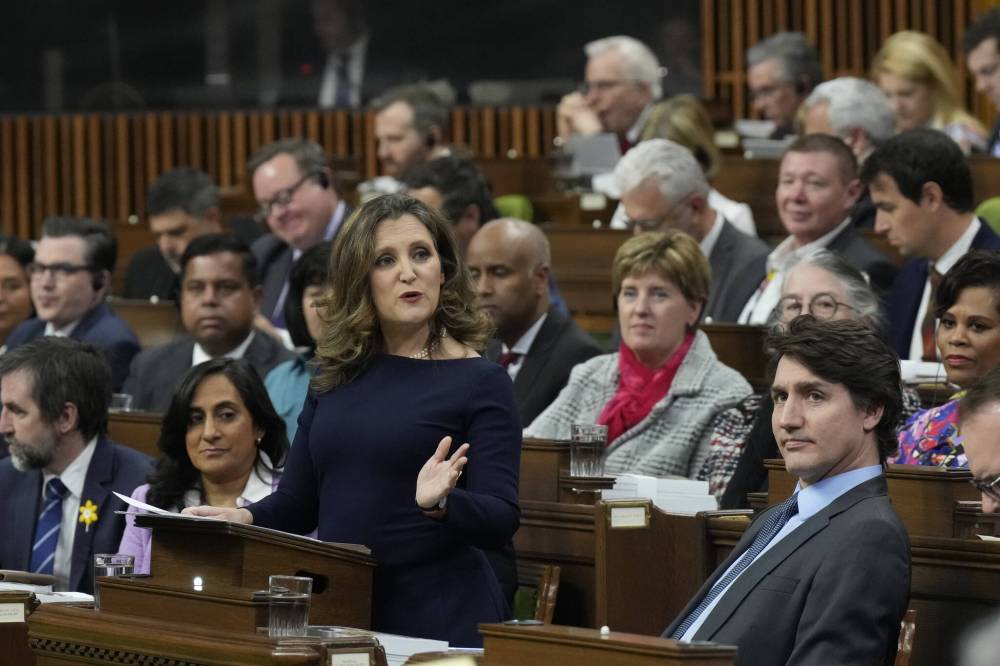Prime Minister Justin Trudeau has never balanced the books. The Liberal leader promised voters during the 2015 federal election campaign that if his party formed government, it would incur a series of small deficits of $10 billion or less and return to balance by 2019-20.
It never happened.
Even before the COVID-19 pandemic hit in 2020, when governments worldwide borrowed heavily in the face of a collapsing global economy, annual shortfalls under the Liberals grew well beyond $10 billion. That trend has continued since the end of the pandemic, with no end in sight.

Deputy Prime Minister and Minister of Finance Chrystia Freeland presents the federal budget as Prime Minister Justin Trudeau listens in the House of Commons in Ottawa on Tuesday (Adrian Wyld / The Canadian Press)
After almost a decade in office, the Trudeau Liberals have refused to live within their means, leaving future generations of Canadians to repay hundreds of billions of borrowed dollars.
There were no signs of a departure from that trend in this week’s federal budget. Finance Minister Chrystia Freeland is projecting a deficit of $39.8 billion for 2024, with no plans to balance the books in the near future. In her medium-term fiscal outlook, the minister predicted federal deficits would shrink over the next five years. However, if the past nine years are any indication, those projections are just a mirage.
The Liberals have promised in every budget since 2015 to gradually reduce the size of the deficit. They use buzzwords such as “fiscal guardrails” and “budgetary anchors” to give the appearance of fiscal responsibility. Yet, the smaller deficits never materialize. The balanced budget can gets kicked down the road every year.
In 2022, for example, the Trudeau government projected a deficit of $27.8 billion for 2024-2025 and a shortfall of $8.4 billion by 2026-2027. Two years later, the estimated deficit for 2024-2025 has grown to nearly $40 billion and the expected shortfall for 2026-2027 has more than tripled to $30.8 billion.
Those deficits pile up in the form of federal debt, which has more than doubled to $1.4 trillion under the Liberals.
Pandemic costs are responsible for a large chunk of that debt. However, undisciplined spending in the seven years outside of it make up the rest.
The Trudeau Liberals have created what economists call a structural deficit: government is spending more on core programs than it’s collecting in taxes and other revenues. These are not recessionary deficits. They are chronic shortfalls incurred by a government that refuses to live within its means.
From 2018 to 2022, the Liberals recorded the five highest levels of program spending (adjusted for inflation and excluding debt interest costs) per person in Canadian history.
As the federal debt grows to pay for that record spending so, too, does the cost of servicing it. Interest on the debt has ballooned from $20.3 billion in 2020-2021 to a staggering $54.1 billion in 2024-2025. Some of that is driven by higher interest rates and some from a larger debt.
That leaves less money available for program spending. It becomes a vicious cycle.
The Trudeau government argues that because the federal debt as a percentage of the economy (the debt-to-GDP ratio) has stabilized and even declined somewhat, current deficits are sustainable. However, the debt-to-GDP ratio, at 41.9 per cent this year (down slightly from 42.1 per cent last year) is still considerably higher than it was prior to the pandemic (31 per cent). And the projections into the future (for what they’re worth from this government), still show a debt-to-GDP ratio of 39 per cent in 2028-2029.
Most importantly, the $1.4 trillion in federal debt has to be repaid one day. That burden has been placed unfairly on the shoulders of future generations. It is immoral and irresponsible to force our grandchildren and their grandchildren to pay for the out-of-control spending of the current government.
Modest, short-term deficits are manageable if they are part of a larger fiscal framework that includes a realistic plan to return to balance. Shortfalls over successive years can be absorbed and managed responsibly. But deficit financing cannot become a permanent condition. It’s not sustainable. Governments cannot live outside of their means forever. Eventually, they have to balance the books and repay the debt they have incurred in order to remain solvent, or to avoid large tax increases.
To pretend that reality doesn’t exist, as the Trudeau government has for the past nine years, is reckless.
tom.brodbeck@freepress.mb.ca

Tom Brodbeck
Columnist
Tom has been covering Manitoba politics since the early 1990s and joined the Winnipeg Free Press news team in 2019.